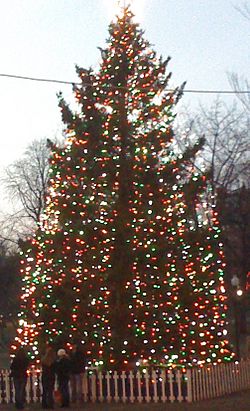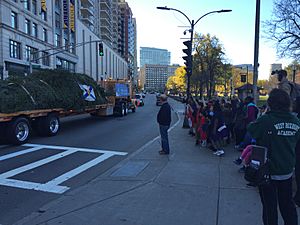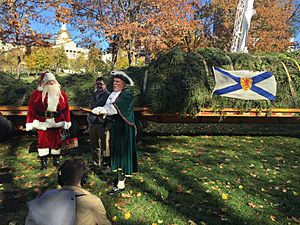Boston Christmas Tree facts for kids
Quick facts for kids Boston Christmas Tree |
|
|---|---|
 |
|
| Status | Active |
| Frequency | Annual |
| Location(s) | Nova Scotia and Boston Common |
| Coordinates | 42°21′20.8322″N 71°3′48.4488″W / 42.355786722°N 71.063458000°W |
| Country | United States and Canada |
| Inaugurated | 1941 |
| Participants | Mayor of Boston, Premier of Nova Scotia, Santa Claus |
| Attendance | 20,000 (lighting) |
| Budget | CA$242,000 |
The Boston Christmas Tree is the official Christmas tree for the city of Boston, Massachusetts. Every year since 1941, a special tree has been lit in Boston. Since 1971, the people of Nova Scotia, Canada, have given this tree to Boston. It's a thank-you gift for the help Boston gave after a huge explosion in Halifax in 1917. The tree stands tall and bright in the Boston Common during the Christmas season.
Contents
Why Boston Gets a Christmas Tree from Nova Scotia
This special Christmas tree is a symbol of friendship between Nova Scotia and Boston. It all started because of a terrible event that happened a long time ago.
The Halifax Explosion of 1917
On December 6, 1917, a massive explosion rocked the city of Halifax, Nova Scotia. It was one of the biggest non-nuclear explosions ever. Much of the city was badly damaged. When Boston heard the news, they quickly sent help. A relief train left Boston around 10 PM, carrying food, water, and medical supplies. Even though a blizzard delayed the train, it arrived on December 8. The medical staff from Boston helped the tired Nova Scotian doctors and nurses. Children in Nova Scotia learn about this event in school. They know that Boston was one of the first to help, truly saving lives.
A Gift of Thanks and Friendship
Because of Boston's quick help, Nova Scotia began sending a Christmas tree as a thank-you. The first two trees were sent in 1971 and 1972 by Joseph Slauenwhite from Lunenburg County. Since then, a tree has been sent every year. This annual gift helps remember the help Boston gave. It also promotes Christmas tree exports from Nova Scotia. In 1976, the Nova Scotia Government took over the tradition. They wanted to continue the goodwill and encourage trade and tourism.
In 2017, on the 100th anniversary of the explosion, leaders from Boston and Halifax honored the event. They placed a special plaque on the Boston Common. That year's tree was given to honor all first responders in both cities. Nova Scotia also gives smaller trees to homeless shelters in Boston, like Rosie's Place and the Pine Street Inn.
Recent Tree Donors
Here are some of the families and groups who have donated the Boston Christmas Tree in recent years:
| Year | Tree location | Donor |
|---|---|---|
| 2024 | Mattie Settlement, Antigonish County | Hugh and Liz Ryan |
| 2023 | Stewiacke | Bette Gourley |
| 2022 | Christmas Island | Townsend family |
| 2021 | Orangedale, Inverness County | L'Arche, Cape Breton |
| 2020 | Grande Anse, Richmond County | Heather and Tony Sampson |
| 2019 | Black Point, Pictou County | Desmond Waithe and Corina Saunders |
| 2018 | Oxford, Cumberland County | Ross McKellar and Teresa Simpson |
| 2017 | Blue's Mills, Inverness County | Bob and Marion Campbell |
| 2016 | Ainslie Glen, Cape Breton Island | Crown land |
| 2015 | Pictou County | Andrea and William MacEachern |
| 2014 | Purlbrook, Antigonish County | John and Ethel Ann MacPherson |
| 2013 | Mill Cove | Mary Lou Milligan |
| 2011 | Central Argyle | Ken and Donna Spinney |
| 2010 | North Alton | Gary and Roseann Misner |
| 2008 | Clementsvale, Annapolis County | Craig and Marina Cook |
| 2007 | Annapolis Valley | Christopher and Lisa Hamilton |
| 2006 | New Ross | Alan and Antoinette Broome |
| 1972 | Lunenburg County | Joseph Slauenwhite |
| 1971 | Lunenburg County | Joseph Slauenwhite |
Choosing the Perfect Tree
Finding the right tree for Boston is a big job! A special expert, called the Christmas Tree Extension Specialist, is always looking for trees. They keep a list of possible trees for years. The search for the next year's tree often starts as early as June or July.
Most families who own a chosen tree feel very proud to donate it. They understand the important reason it's going to Boston. Many say it's a great honor to have their tree selected. Sometimes, a tree is even donated in memory of a family member who died in the 1917 explosion.
Tree Requirements
The Nova Scotia Department of Natural Resources has strict rules for choosing the tree. It must be a beautiful balsam fir, white spruce, or red spruce. The tree needs to be about 40 to 50 feet (12 to 16 meters) tall. It must be healthy, have a good color, and be full and evenly shaped. It also needs to be easy to reach for cutting. These trees usually grow in open areas, not on tree farms, so they can grow very tall and wide.
The Christmas Tree Specialist
The Nova Scotia Department of Natural Resources Christmas Tree Specialist is in charge of picking the tree each year. This person needs to know where the best trees are in the province. They also need to convince the owners to give them up. Ross H. Pentz has been the specialist since 2001.
Cutting and Celebrating the Tree
Before the tree is cut, each branch is carefully tied to the trunk. This takes two people about a day and a half. A large crane holds the tree at the top while it is cut at the bottom with a chainsaw.
The tree cutting ceremony is a big event for Nova Scotians. Many people attend, including local school children and officials. There are often special guests like a town crier, Royal Canadian Mounted Police, and Santa Claus. Music is also a big part of the celebration.
The Tree's Long Journey

The tree travels more than 750 miles (1,200 kilometers) to Boston. First, it stops at the Grand Parade in Halifax for a public send-off party. People can sign a thank-you book for Boston. The tree then travels by truck across Nova Scotia. It takes a ferry across the Bay of Fundy and continues by truck through Maine and New Hampshire. Along the way, people often line the roads to see the tree and take pictures.
In 2013, runners led the tree out of Halifax. They did this to honor the victims of the Boston Marathon bombing. Special permits are needed to transport the huge tree through different areas.
Arrival and Lighting in Boston
When the tree arrives in Boston, it gets a police escort. Just like in Nova Scotia, Boston schoolchildren are there to welcome it to the Boston Common.
The tree lighting ceremony happens in late November or early December on the Common. About 20,000 people come to watch the lights turn on. Many more watch the event broadcast on TV. The tree is decorated with thousands of lights and miles of wire. For example, the 2006 tree had 8,000 bulbs.
From 1971 to 2002, the Nova Scotia tree was placed at the Prudential Center. It was moved to the Boston Common in 2002.
Why the Tree is Important to Nova Scotia
The Boston Christmas Tree is a very important tradition for the people of Nova Scotia. People have strong feelings about it. They have even written songs about it! Nova Scotia's Lands and Forestry Minister called it "one of our proudest traditions." A spokesperson for the department said, "The whole province gets excited about the tree. It’s a big deal."
The Cost of the Gift
While the Christmas Tree is a gift, it's also a way for Nova Scotia to promote itself. In 2015, the total cost for the tree, its journey, ceremonies, and parties was about CA$242,000 (about US$179,000).
This cost includes finding and cutting the tree, which is about CA$1,900 and CA$2,500 respectively. The send-off event in Halifax cost around CA$10,000, and transporting the tree was about CA$4,000. Nova Scotia also pays for officials to travel to Boston. They also pay a Boston TV station to broadcast the tree lighting special. This broadcast helps promote Nova Scotia to a large audience. Experts say that considering all the media attention Nova Scotia gets, it's a good value for the province.
Media Attention
The tree cutting ceremony and the send-off in Halifax get a lot of local media coverage. TV stations often host these events. They also report live from Boston during the lighting ceremony. The tree is also promoted on social media platforms like Facebook and Instagram. This media attention helps Nova Scotia share its story and beautiful scenery with many people.
See also
- Boston–Halifax relations
- List of individual trees
 | Janet Taylor Pickett |
 | Synthia Saint James |
 | Howardena Pindell |
 | Faith Ringgold |


